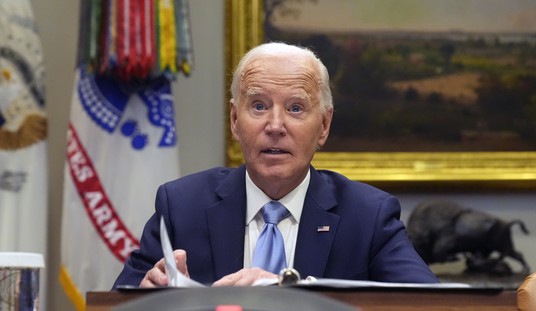Some Republican lawmakers are deeply concerned about President Donald Trump’s tariff gambit for more reasons than one. Many have argued that using tariffs will only raise prices for American consumers.
However, others are worried about something else: Maintaining political power.
The Hill reported that GOP lawmakers have expressed concerns that the trade wars' impact might negatively impact their chances of retaining control over both chambers of Congress in the 2026 midterm elections.
Republican lawmakers say there’s a good chance that President Trump’s trade war will boomerang on Republicans politically in 2026, as rising prices and shrinking growth could offset other accomplishments by the GOP.
Republican senators are pointing to the 1932 and 1982 elections as historical examples of when trade wars and resulting price inflation hurt their party at the ballot box, and they are worried that history could repeat itself.
Many Republican lawmakers view tariffs as a tax hike on American consumers, and some note that the last two times Congress enacted tax hikes on the scale of Trump’s recent tariffs, the president’s party suffered a wipeout in the next election.
Sen. Thom Tillis (R-NC) noted that “In the national elections, you can go back to 1982 when I think it was about 26 congressional seats that were lost [by Republicans].”
The lawmaker added, “If we’re having the same discussions about tariffs in February or next year, all the indicators would be ‘wrong track.’”
Recommended
Sen. Mike Rounds (R-SD) indicated that the impact of Trump’s tariffs – especially on the stock markets – has been an issue for his constituents, pointing out that “It’s not good for my farmers” and that “We’ve got a lot of people that rely on being able to sell our commodities around the world.”
Trump’s 90-day pause has brought a sigh of relief – at least for the time being. But Trump is still maintaining the tariffs he slapped on China, whose government responded with its own retaliatory duties on US products.
Sen. Rand Paul (R-KY) has been an outspoken critic of the trade wars. He also warned that this gambit could produce negative outcomes for Republican politicians in the next elections. This is especially true if a recession ensues.
Sen. Rand Paul (R-Ky.) is warning fellow Republicans that they could face landslide defeats next year if they don’t change course on trade, which he says could trigger a severe economic recession.
Paul pointed out that the authors of the 1930 Smoot-Hawley Tariff Act — Sens. Reed Smoot (R-Utah) and Willis Hawley (R-Ore.) — were both defeated in the 1932 election.
He said he believes the tariffs enacted in 1930 made the Great Depression significantly worse and hurt the Republican Party’s brand for decades afterward.
“We went into the wilderness for a long, long time,” he said. “The depression was multifactorial, but most historians have written that that Smoot-Hawley tariff actually made things worse and the depression longer.
“I don’t think the politics are good,” he said. “The economics of tariffs are bad; the politics, if anything, are worse.”
Democrats are already using the uncertainty surrounding Trump’s tariffs in campaign ads against Republicans, Politico reported.
Hours before Trump announced the tariff pause, the Democratic-aligned super PAC American Bridge released audio of Virginia Lt. Gov. Winsome Earle-Sears, the GOP gubernatorial nominee, praising Trump’s tariff plan. Democrat Mike Sacks announced his candidacy Wednesday in a nearly two and a half minute ad. It featured an image of the word “tariff” nine times in bold red font along with a crimson-color graphic of a stock market plunging that was superimposed over the face of his opponent, incumbent Rep. Mike Lawler (R-N.Y.), widely considered one of the most vulnerable House Republicans next cycle.
The Democratic-aligned group Families Over Billionaires, a nonprofit, is putting six figures into an ad running on social media and streaming platforms bashing the Trump administration over tax plans, and Democrats are planning a new round of town halls in GOP-held House districts over the upcoming recess.
Democrats argue the upheaval Trump injected into the economy undercuts the central premise that he campaigned on: that as a businessperson, he would be best positioned to grow the economy.
A recent CBS News/YouGov poll found a significant number of everyday Americans expressing concerns about how the trade wars might affect them. Specifically, 75 percent of respondents believe the new tariffs will result in increased prices over the short term.
Most respondents (65 percent) believe the new tariffs will make the economy worse while only eight percent predicted that they will benefit the economy. About 27 percent said they will either have no impact or they were not sure what impact they would have.
About 49 percent believed the tariffs will result in more manufacturing jobs, however. Only 25 percent suggested manufacturing jobs will be lost while 26 percent believed the numbers would stay the same.
Even further, 75 percent predicted the tariffs would raise prices, while about 20 percent said they would not have any impact or were unsure whether they would influence prices. Only five percent believed the tariffs would lower prices.
Still, the eventual outcome of Trump’s trade gambit is too early to tell. As the maxim goes, “It’s the economy, stupid.” It’s not complicated. If Trump’s tariffs result in higher prices, a recession, or no impact at all, then Republicans have every reason to be afraid they will lose at least one chamber of Congress in 2026.
Nevertheless, it is also possible that the tariff strategy might work. Perhaps the 70 countries that have expressed interest in working out deals is a sign that Trump is moving in the right direction. If he can handle these negotiations in a way that does not increase prices for everyday Americans, it could redound to Republicans' benefit. It all depends on whether Americans' wallets are not lighter in two years than they are now.
The economy was the top priority for voters during the 2024 campaign, and more voters trusted Trump to handle the issue than former Vice President Kamala Harris. This means there must be an improvement by the time people go to cast their ballots in two years. Otherwise, Republicans might lose any chance of remaining in power.

























